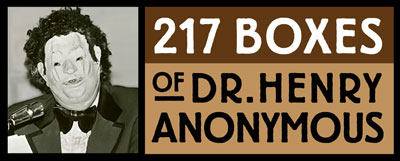About 217 Boxes

“Ain Gordon haunts the margins of history … conjur(ing) the sort of distant lives that don’t make it into textbooks, processed into oblivion by what he calls history’s ‘ruthless editing machine.’”
– The New York Times
The Historical Society of Pennsylvania, funded by the Pew Center for Arts & Heritage, commissioned Guggenheim Fellow and Obie-Award Winner Ain Gordon to examine the archive of Dr. John Fryer. Drawing from 217 boxes of Fryer’s papers, Gordon weaves the largely unknown story of a courageous gay psychiatrist whose activism made a profound and lasting impact on LGBT civil rights.
Produced by Equality Forum, the nation’s leading LGBT history organization, 217 Boxes of Dr. Henry Anonymous offers a portrait of John Fryer, M.D., from the perspective of three key figures in his life. Disguised in a mask and using a voice modulator, Fryer testified as Dr. Henry Anonymous on a homosexuality panel at the 1972 Annual Meeting of the American Psychiatric Association (APA). He faced the loss of his medical license should his identity be discovered.
Raised in rural Kentucky, Fryer graduated in 1962 from Vanderbilt University School of Medicine to pursue a career in psychiatry. He was a professor of psychiatry at Temple University School of Medicine when he made his historic APA appearance. The play reflects Fryer’s experience dealing with his sexual orientation and societal homophobia during a time when the APA classified homosexuality as a mental illness and homosexuals were treated as pariahs.
Fryer’s compelling testimony led the APA at its 1973 Annual Meeting to remove homosexuality from its Diagnostic and Statistical Manual of Mental Disorders (DSM). As a result, so-called cures such as electric shock therapy, chemical castration, institutionalization and lobotomy were discontinued, and mental illness was no longer used to justify homophobic ordinances, statutes and regulations.
